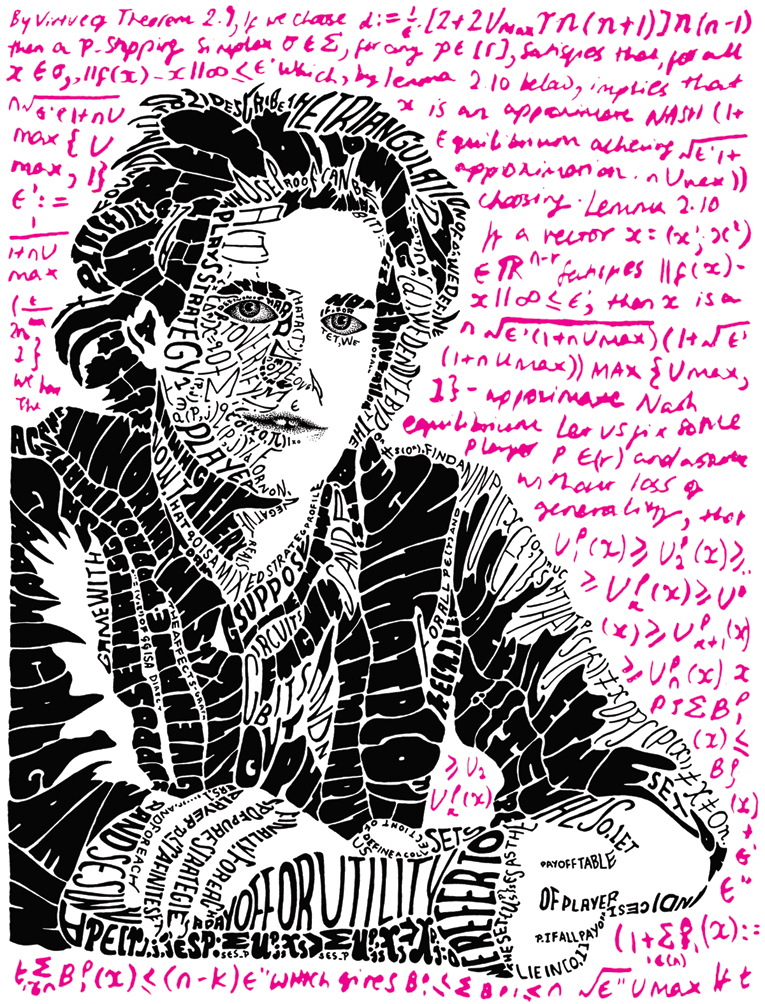New Connections Between Online Learning and Game Theory
Constantinos Daskalakis (MIT)
July 2 at 1:30pm
Abstract & Bio
Abstract:
From playing complex games at super-human level to training deep generative models to training deep neural net-based models that interact with each other and with humans, many outstanding challenges in Machine Learning lie at its interface with Game Theory. These applications motivate the study of games with infinitely many strategies and/or non-concave utilities, which are challenging in that standard notions of equilibrium are not guaranteed to exist, and when they do exist they may be infinitely supported and thus impractical to compute or implement. We develop new connections between Online Learning, Complexity Theory, and Game Theory to shed light on these equilibrium existence and computation challenges, providing game-theoretic and algorithmic foundations for this intricate setting.
Bio: Constantinos (aka "Costis" with an accent on 'i') Daskalakis is the Avanessians Professor of Electrical Engineering and Computer Science at MIT. He holds a Diploma in Electrical and Computer Engineering from the National Technical University of Athens, and a PhD in Electrical Engineering and Computer Science from UC Berkeley. He works on Computation Theory and its interface with Game Theory, Economics, Probability Theory, Machine Learning and Statistics. He has resolved long-standing open problems about the computational complexity of Nash equilibrium, and the mathematical structure and computational complexity of multi-item auctions. His current work focuses on multi-agent learning, high-dimensional statistics, learning from biased and dependent data, causal inference and econometrics. He has been honored with the ACM Doctoral Dissertation Award, the Kalai Prize from the Game Theory Society, the Sloan Fellowship in Computer Science, the SIAM Outstanding Paper Prize, the Microsoft Research Faculty Fellowship, the Simons Investigator Award, the Rolf Nevanlinna Prize from the International Mathematical Union, the ACM Grace Murray Hopper Award, the Bodossaki Foundation Distinguished Young Scientists Award, the ACM SIGECOM Test of Time Award, and the FOCS 2022 Test of Time Award. He is an ACM fellow, holds an honorary doctorate from the University of Patras, and was awarded the Golden Cross of the Order of the Redeemer by the Greek Presidency. He has served in the scientific and advisory board of the Simons Institute for the Theory of Computing (2018-2020), and as the head of the theory of computation group at MIT (2018-2022). He is a co-founder of Archimedes AI research center where he maintains the role of chief scientist.
Bio: Constantinos (aka "Costis" with an accent on 'i') Daskalakis is the Avanessians Professor of Electrical Engineering and Computer Science at MIT. He holds a Diploma in Electrical and Computer Engineering from the National Technical University of Athens, and a PhD in Electrical Engineering and Computer Science from UC Berkeley. He works on Computation Theory and its interface with Game Theory, Economics, Probability Theory, Machine Learning and Statistics. He has resolved long-standing open problems about the computational complexity of Nash equilibrium, and the mathematical structure and computational complexity of multi-item auctions. His current work focuses on multi-agent learning, high-dimensional statistics, learning from biased and dependent data, causal inference and econometrics. He has been honored with the ACM Doctoral Dissertation Award, the Kalai Prize from the Game Theory Society, the Sloan Fellowship in Computer Science, the SIAM Outstanding Paper Prize, the Microsoft Research Faculty Fellowship, the Simons Investigator Award, the Rolf Nevanlinna Prize from the International Mathematical Union, the ACM Grace Murray Hopper Award, the Bodossaki Foundation Distinguished Young Scientists Award, the ACM SIGECOM Test of Time Award, and the FOCS 2022 Test of Time Award. He is an ACM fellow, holds an honorary doctorate from the University of Patras, and was awarded the Golden Cross of the Order of the Redeemer by the Greek Presidency. He has served in the scientific and advisory board of the Simons Institute for the Theory of Computing (2018-2020), and as the head of the theory of computation group at MIT (2018-2022). He is a co-founder of Archimedes AI research center where he maintains the role of chief scientist.
